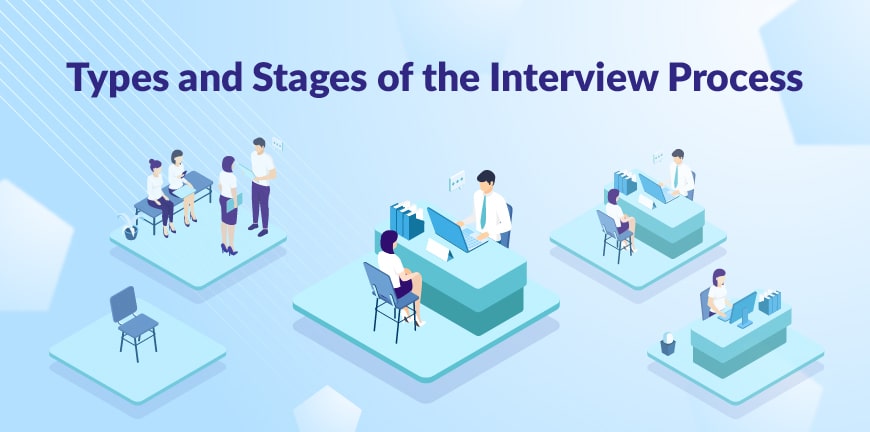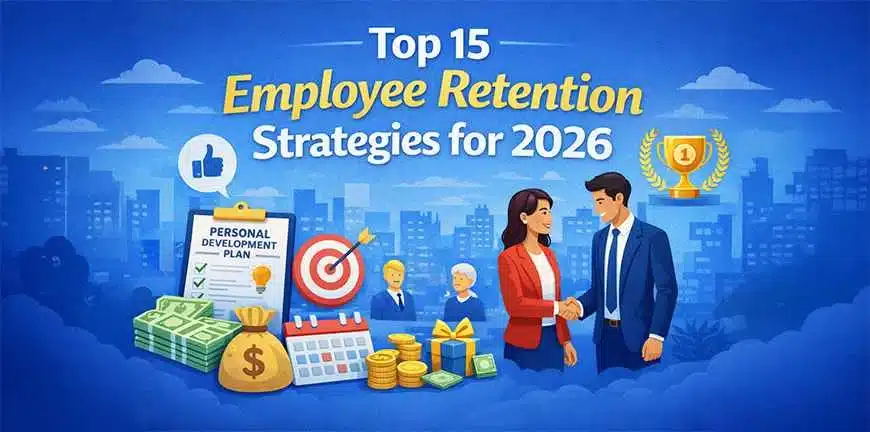
What Is a Payroll Audit? Types, Steps, and Benefits
07/04/2025
What is Compliance Due Diligence? Definition, Types, Benefits, Process, Examples
08/04/2025An interview can be unnerving, whether you’re a seasoned professional or a newbie. However, with a little preparation and the correct mindset, you can transform the daunting experience into a winning streak. You need to be armed with tools that will open a plethora of opportunities for you.
An interview process entails multiple stages, ranging from initial screening to final interviews and decision-making. With the evolving job market, the methods of interviewing are also changing, and the advent of innovative technology is enhancing the process in a big way. Let us look at the types of the interview process:
6 Types of the Interview Process
1. Phone Interviews
In the recruitment process, one of the first interview process steps is a phone interview. In this procedure, the recruiter essentially screens the candidate quickly over the phone. They will ask a few questions and will be able to assess whether their skills and experiences will align with job descriptions.
2. Video Interviews
Since there has been a rise in remote and hybrid work, the video interviewing process has gained traction due to this trend. Recruiters can conduct live interviews using platforms like Zoom, Microsoft Teams, etc. There is another way where the interview is pre-recorded, and you will be requested to respond to a set of questions at your convenience.
3. In-Person Interviews
One of the most traditional interview selection processes is the face-to-face interview where recruiters meet the candidates physically and ask them questions. Not just that they try to assess their personality through body language and communication but learn about their skills and experiences. This type of interview is comprehensive and can involve multiple rounds entailing interactions withs several members of the team or senior management.
4. Panel Interviews
A panel interview is an interview process where a candidate is interviewed by a group of individuals like the hiring manager, HR representatives, and team members. This process is a great way to assess candidates as a company can get diverse perspectives on how suitable the role is for them.
5. Technical Interviews
Technical interviews are typically for roles requiring specific technical skills like programming, engineering or data analysis. These hr interview process steps will essentially test the expertise of a candidate in the core skills required for the role that often involves problem-solving tasks or practical tests.
6. Assessment Centre Interviews
Certain organizations that have numerous candidates to interview, take the assistance of assessment centers to evaluate them in a controlled environment. These interviews may entail processes like group exercises, individual tasks, role-playing, presentations, etc. These interviews are crafted to assess the candidate’s teamwork, communication and leadership skills.
Stages of the Interview Process
Now that we have gained knowledge about the different types of interviews, let’s rake a look at the various stages of the typical interview process:
1. Initial Screening
The first stage of a company interview process is typically where hiring managers or recruiters conduct the initial telephone or video screening after reviewing a resume. The objective of the recruiters is to determine the skills and experience of a candidate and whether it will align with the job.
2. First Interview
The main interview stage is the first interview where recruiters try to obtain an in-depth knowledge of a candidate’s qualifications, work history and whether they will be fit for the company. This process could be a one-on-one interview, a panel interview, or even a technical interview depending on the organization.
3. Assessment Stage
There are some cases, where a candidate is required to complete assessments or tasks. The assessments can entail coding challenges, case studies, or role-playing. Essentially exercises that are designed to assess a candidate’s practical skills.
4. Second-Round Interview
The second-round interview is essentially a more extensive process that may entail and senior management, team members, or a panel. It may also present situational or case study questions to evaluate how a candidate can tackle real-world problems.
5. Final Interview
After passing the initial stages of an interview procedure a candidate is invited to a final round of interviews. This stage is more rigorous and might include extensive discussions, often with top-tier executives or team leaders. This stage can also be an It’s also an opportunity to discuss salary expectations, benefits and other logistics.
6. Offer and Negotiation
Among the 5 stages of the interview process, the most significant stage for a candidate is the fifth stage where the company extends a job offer. This phase gives a candidate the opportunity to negotiate terms like salary, benefits and working conditions. In this stage, a candidate can get clarity from the recruiters on the role and the company.
7. Background Check
After the acceptance of an offer by the candidate, most organizations conduct background and reference checks to verify a candidate’s work history, educational background or criminal record if any.
8. Onboarding
Once the HRM interview process is complete and things are finalized, a recruiter moves on to the onboarding phase, where a candidate typically fills out the necessary paperwork, sets up their work tools, and begins their role.
An interview process can feel lengthy and tedious; however, each stage presents an opportunity for both the candidate and the employer to learn more about each other. Whether you are an interviewee or the one conducting the interview, a positive experience is created if you approach each interview stage professionally and thoughtfully.
Frequently Asked Questions (FAQs)
1. What is the interview process?
The interview process is designed in a structured manner where there is a series of questions asked by an interviewer or a hiring manager to potential job candidates assessing their qualifications, skills, experience and if they are overall fit for a desired job role.
2. Why Is an interview process important for students?
The interview process is significant for students as it gives them an opportunity to present their skills, knowledge to employers, enabling them to secure jobs or get admitted to universities developing valuable communication and problem-solving skills.
3. How to improve the interview process in an organization?
An organization’s interview process can be enhanced by focusing on structured questions, clear communication and creating a positive candidate experience. This is done while the company collects valuable feedback and uses data to make informed decisions.
4. How long does the Amazon interview process take?
The Amazon interview process usually can take a couple of months or can take anywhere from a few weeks. It depends on the job profile, the number of candidates, and schedules. Senior positions usually take longer.
5. What are the steps in the interview process?
Several steps are included in a job interview like a screening, phone or video interviews, skills assessments, multiple rounds of interviews including first, second and sometimes third and finally a decision and job offer.
6. Why interview is important in the recruitment process?
An interview process is vital in recruitment because it lets employers evaluate and analyze a candidate’s skills, experience and personality beyond what is written in a resume, ensuring a suitable fit for the role and company culture.
Contact Us For Business Enquiry

Rajkumar Shanmugam
Rajkumar Shanmugam is the Head of HR at ALP Consulting, bringing over 19 years of comprehensive HR leadership experience across India and international markets. His expertise spans talent acquisition, employee relations, performance management, compliance, and HR transformation. Rajkumar has a proven track record of driving people-centric initiatives, enhancing workplace culture, and aligning HR strategy with business goals. With extensive experience in US staffing operations and global mobility, he continues to lead organizational excellence through innovation and employee engagement.




